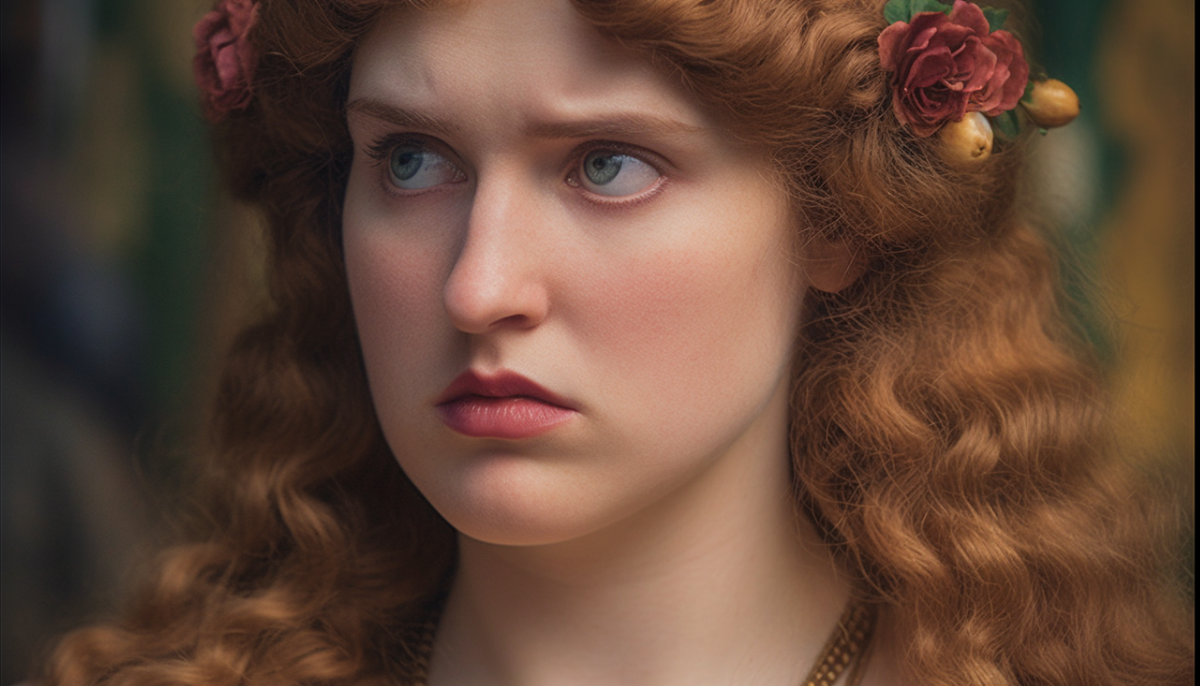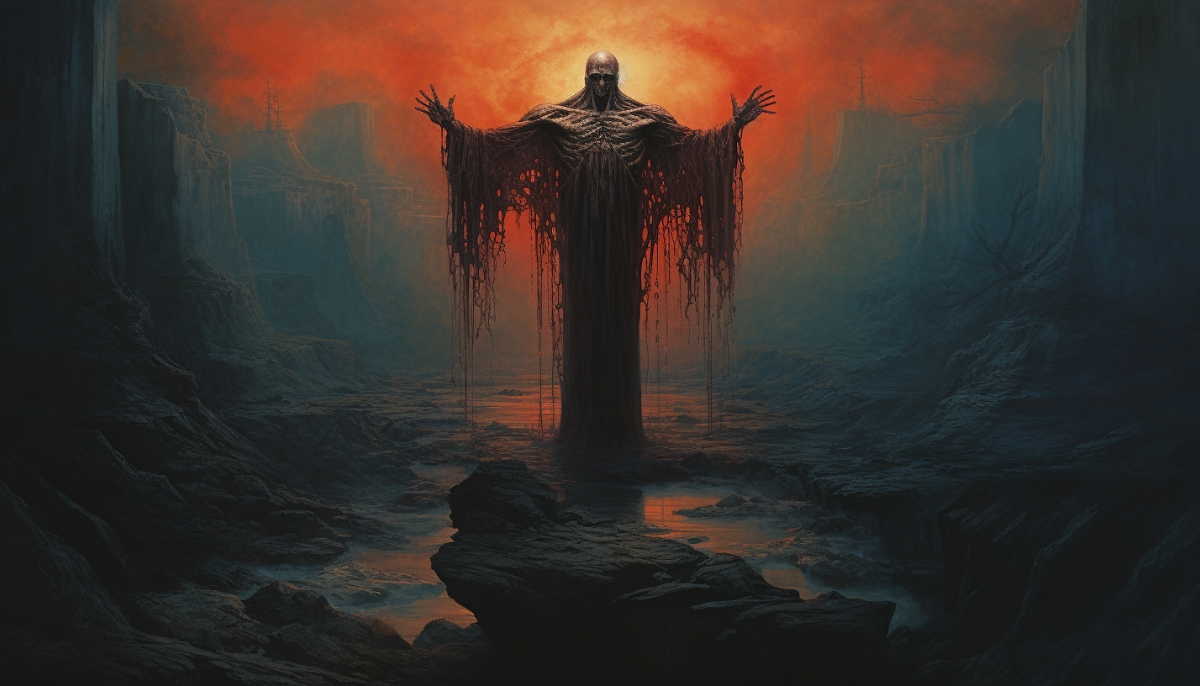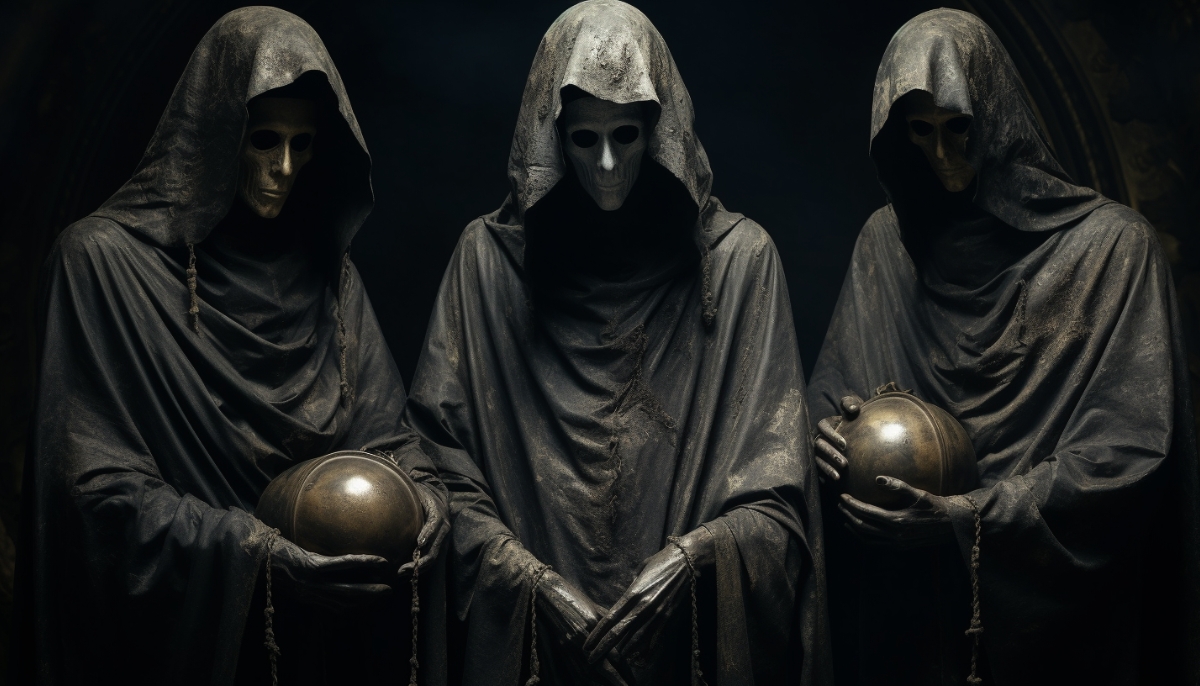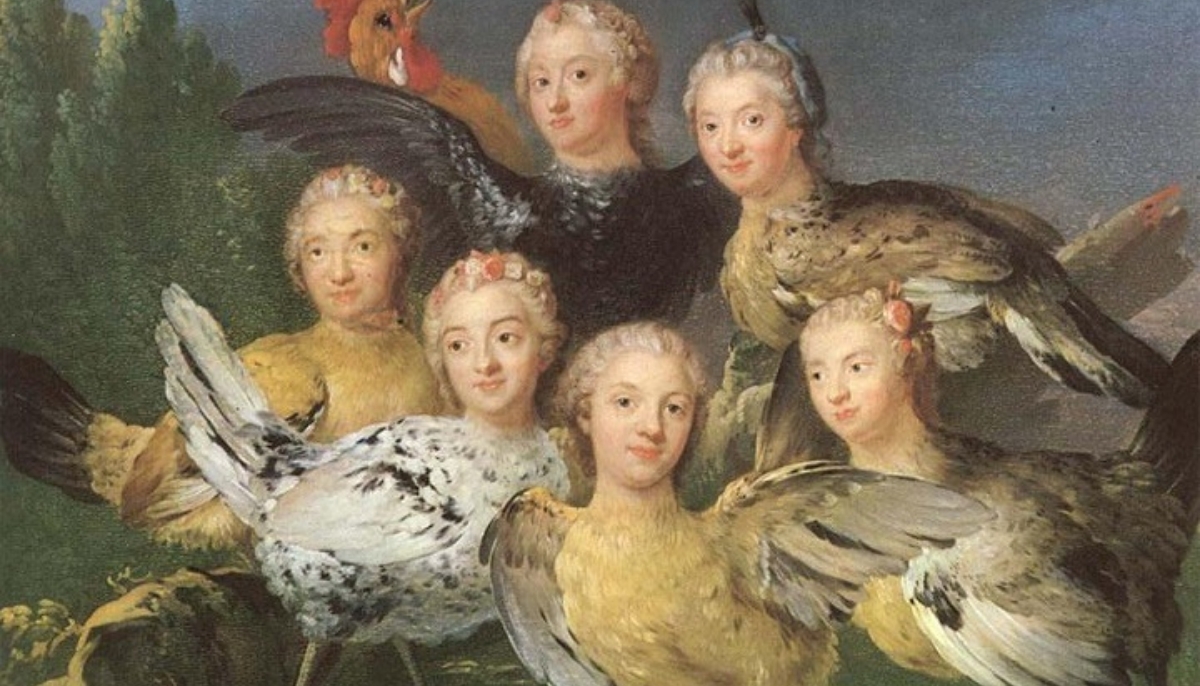Welcome to our journey through the best YA books about Greek mythology, where timeless tales are reborn with a contemporary twist.
We’re diving into a selection of young adult novels that masterfully intertwine the ancient myths of Greece with the vibrancy and challenges of modern storytelling.
From epic love stories set against the backdrop of iconic legends to the compelling reimaginings of mythological figures, these books bring a fresh perspective to age-old narratives.
Get ready to be captivated by the magic, intrigue, and emotional depth of these exceptional YA books about Greek mythology.
This article is one in a series on the best Greek mythology books.
The Best YA Book About Greek Mythology – The Lightning Thief, Percy Jackson and the Olympians, Rick Riordan
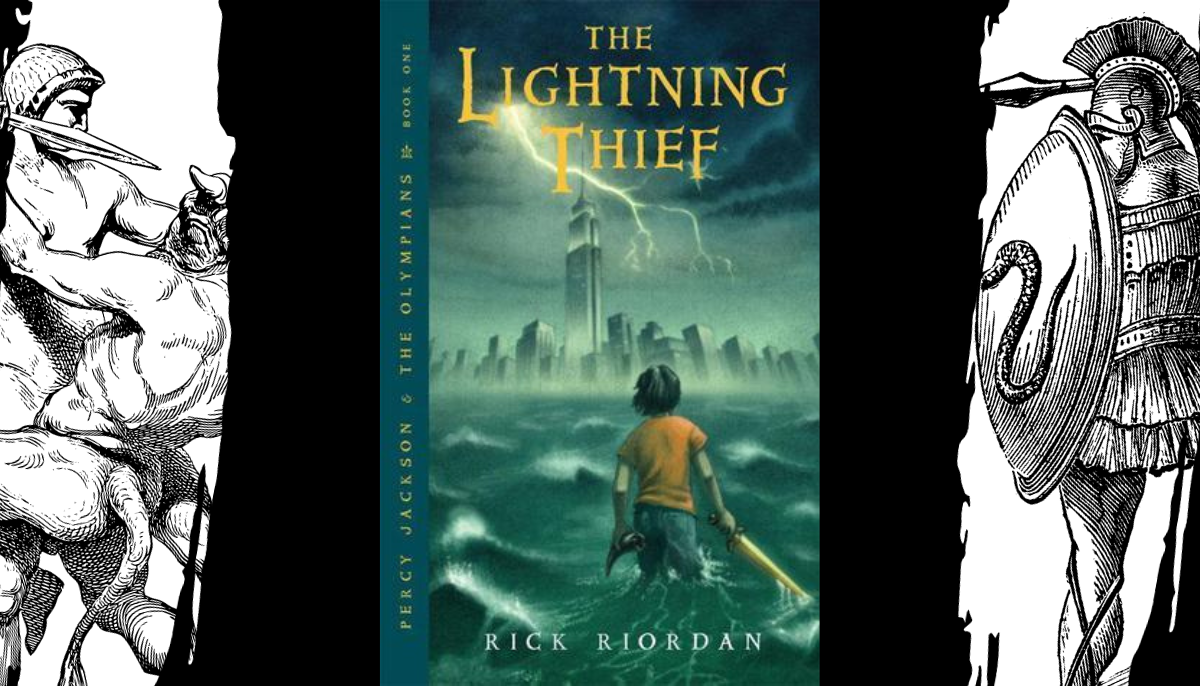
“The Lightning Thief” easily claims the top spot in our list of must-read YA books based on Greek mythology. This first installment in Rick Riordan’s “Percy Jackson & the Olympians” series introduces us to Percy Jackson, a seemingly average kid with more than his fair share of bad luck. His life takes a fantastical turn when he discovers he’s a demigod, the son of Poseidon, and is whisked away to Camp Half-Blood, a sanctuary for young demigods like him.
The charm of The Lightning Thief lies in its brilliant reimagining of Greek mythology in a modern setting. Percy’s adventures are sprinkled with humor, wit, and a refreshing irreverence toward the ancient gods, making the lore accessible and engaging for young readers. Riordan’s narrative captures the essence of Greek mythology while infusing it with a contemporary twist that resonates with the YA audience.
Percy himself is an endearing protagonist, flawed and relatable. His struggles with dyslexia, ADHD, and the usual troubles of teenage life make him a character that young readers can empathize with. The supporting characters, like the wise yet snarky Annabeth and the loyal but hapless satyr Grover, add depth and humor to the story. Their journey to recover Zeus’s stolen lightning bolt is not just an action-packed quest but also a journey of self-discovery and camaraderie.
The Lightning Thief is a clever, funny, and thrilling introduction to Greek mythology packaged in a way that appeals to young adults. Its blend of myth, magic, and real-world challenges makes it a standout choice for any young reader interested in a fresh take on ancient stories.
The Lost Hero – The Heroes of Olympus, Rick Riordan
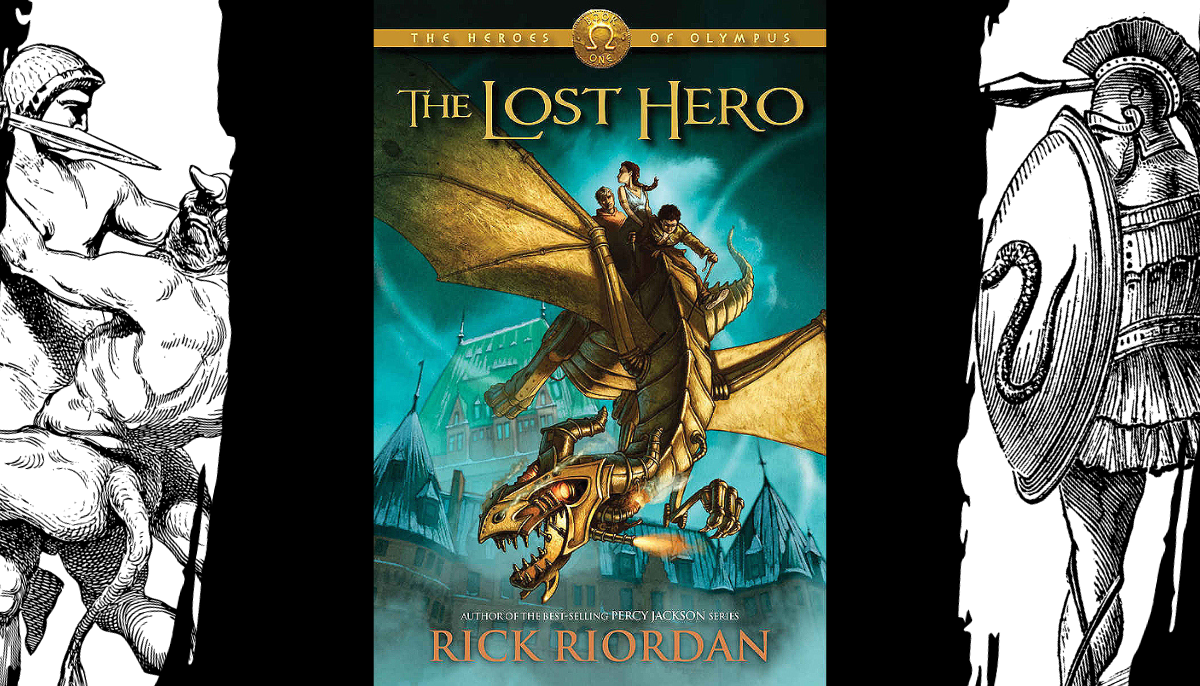
“The Lost Hero,” the first book in Rick Riordan’s “The Heroes of Olympus” series, secures a place in our top 10 YA books inspired by Greek mythology. This novel stands out with its intriguing blend of suspense, humor, and mythological adventure, marking a mature progression from the original Percy Jackson series.
Riordan introduces a fresh trio of protagonists – Jason, Piper, and Leo – each with their unique background and connection to the gods. Jason’s amnesia-driven quest adds an element of mystery, making the reader as eager as Jason himself to uncover his past.
The strength of The Lost Hero lies in its character development. Riordan has matured his writing style, offering more fleshed-out and relatable characters than in his earlier works. Readers who found the original Percy Jackson series juvenile will appreciate this book’s more sophisticated storytelling and character dynamics.
Riordan’s depiction of the gods remains a highlight, portraying them as awe-inspiring yet approachable entities. This blend of the mythical and the mortal world continues to be the hallmark of Riordan’s work, inviting readers into a world where ancient myths and modern life collide in fascinating ways.
While the book has moments of Riordan’s signature humor, which some might find corny, these instances are less prevalent than his earlier series. Reducing lighter, more juvenile elements allows for a richer narrative that appeals to a broader YA audience.
Lore, Alexandra Bracken
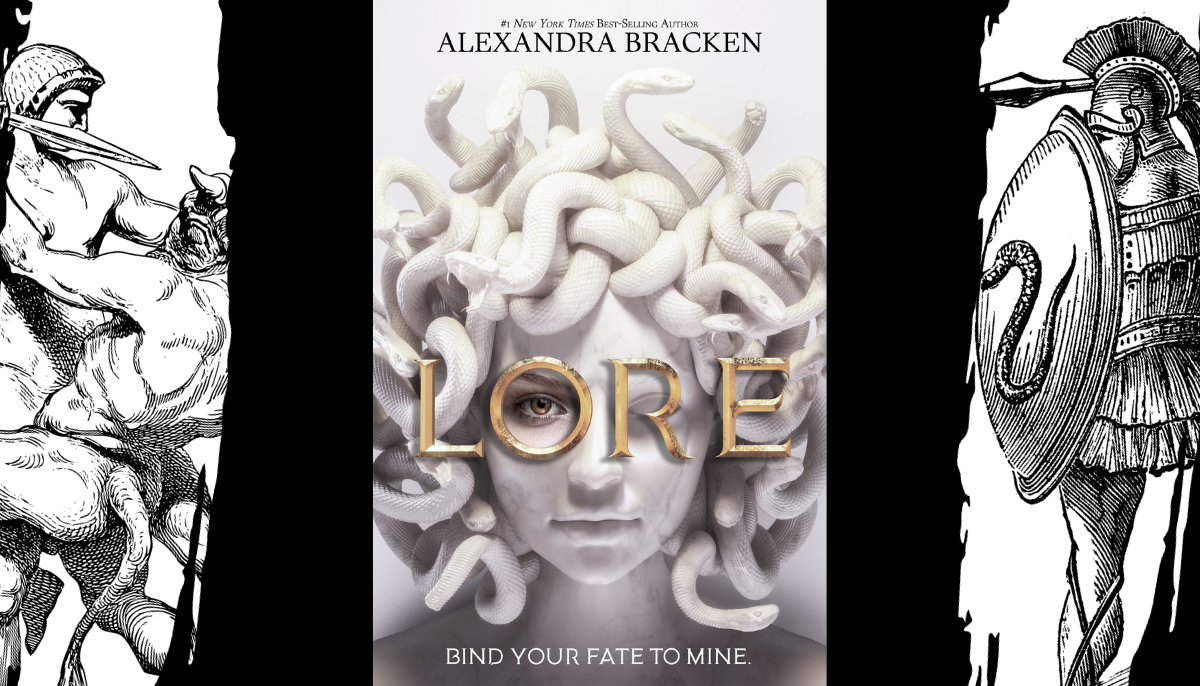
“Lore,” authored by Alexandra Bracken, is a riveting addition to our list of top YA books inspired by Greek mythology. This novel stands out with its unique premise, blending the intensity of “The Hunger Games” with the rich tapestry of Greek myths.
In a world where the Agon forces Greek gods to become mortals and be hunted by descendants of ancient bloodlines every seven years, Lore introduces a captivating protagonist, Melora “Lore” Perseous.
Haunted by the tragic murder of her family during a previous Agon, Lore has turned her back on the world of gods and hunters. However, the sudden reappearance of her childhood friend, Castor, and an injured Athena on her doorstep catapults her back into the deadly game.
Bracken’s storytelling is immersive, weaving a narrative that is action-packed and emotionally resonant. The concept of the Agon is brilliantly executed, offering a fresh take on the Greek gods and their interactions with the modern world. As a character, Lore is a compelling blend of strength and vulnerability. Her evolution from a scarred survivor to a formidable Agon player is believable and inspiring.
The supporting characters, including Castor, Van, Miles, and Iro, add depth to the story with their distinct personalities and dynamics. The inclusion of Miles, who is not from an ancient bloodline, provides an outsider’s perspective on the mythical world, making the story more accessible to readers.
The novel’s climax is filled with twists and turns, keeping readers on the edge. Lore is a testament to Bracken’s skill in creating a fantastical world grounded in emotional truth.
The Song of Achilles, Madeline Miller
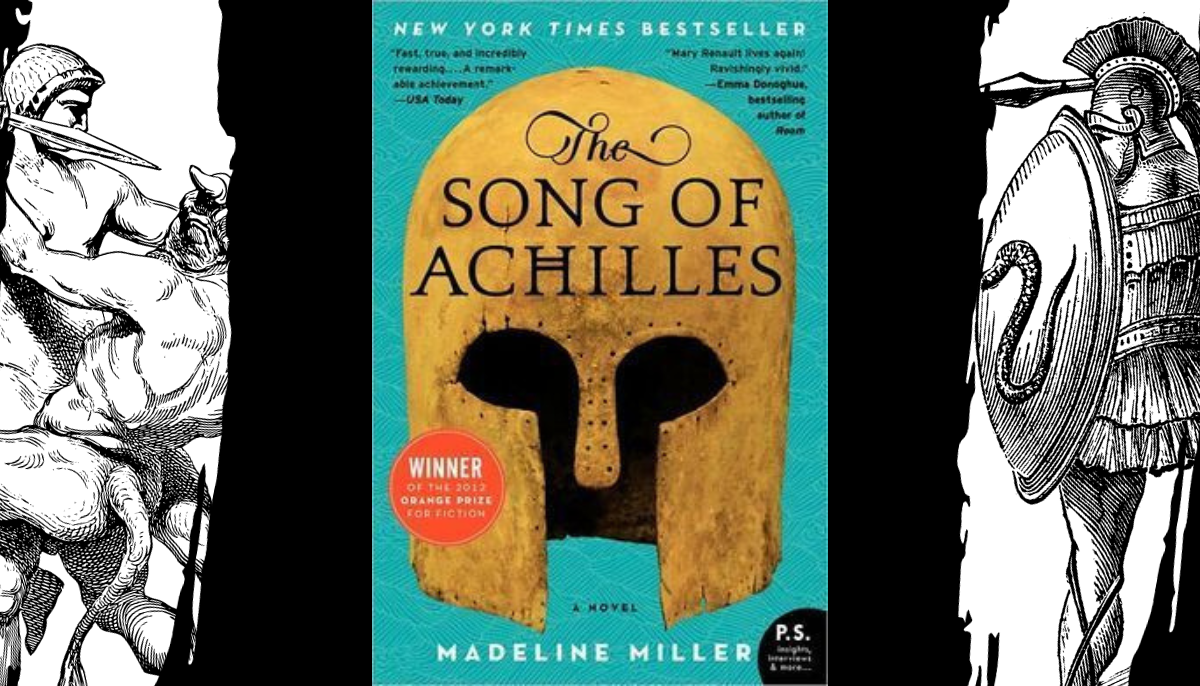
“The Song of Achilles” by Madeline Miller is a breathtaking and profound retelling of the Achilles myth, earning its place as a top contender in our list of YA books inspired by Greek mythology. Miller’s lyrical prose and deep understanding of classical mythology transform a familiar story into an unforgettable exploration of love, destiny, and the human condition.
At the heart of the novel is the relationship between Achilles, the greatest Greek warrior, and Patroclus, an exiled young prince. Their bond is the driving force of the narrative, portrayed with such tenderness and depth that it elevates their story to a new level. Miller’s portrayal of these iconic characters is nuanced, making them feel real and relatable.
The novel’s setting in ancient Greece is vividly rendered, immersing the reader in a world where gods and heroes walk the earth. Miller’s attention to detail and ability to weave mythological elements into her narrative without overwhelming it are commendable.
Miller’s writing style is poetic yet accessible, capturing the story’s epic scope while focusing on the intimate moments that define Achilles and Patroclus’s relationship. The novel is as much a love story as a tale of war and glory. The way Miller handles the well-known fate of Achilles, building a sense of foreboding throughout, is masterful.
One of the novel’s strengths is its exploration of themes such as the nature of heroism, the impact of destiny, and the human yearning for immortality. Through Achilles and Patroclus, Miller examines these timeless ideas, making them resonate with contemporary readers.
Starcrossed, Josephine Angelini
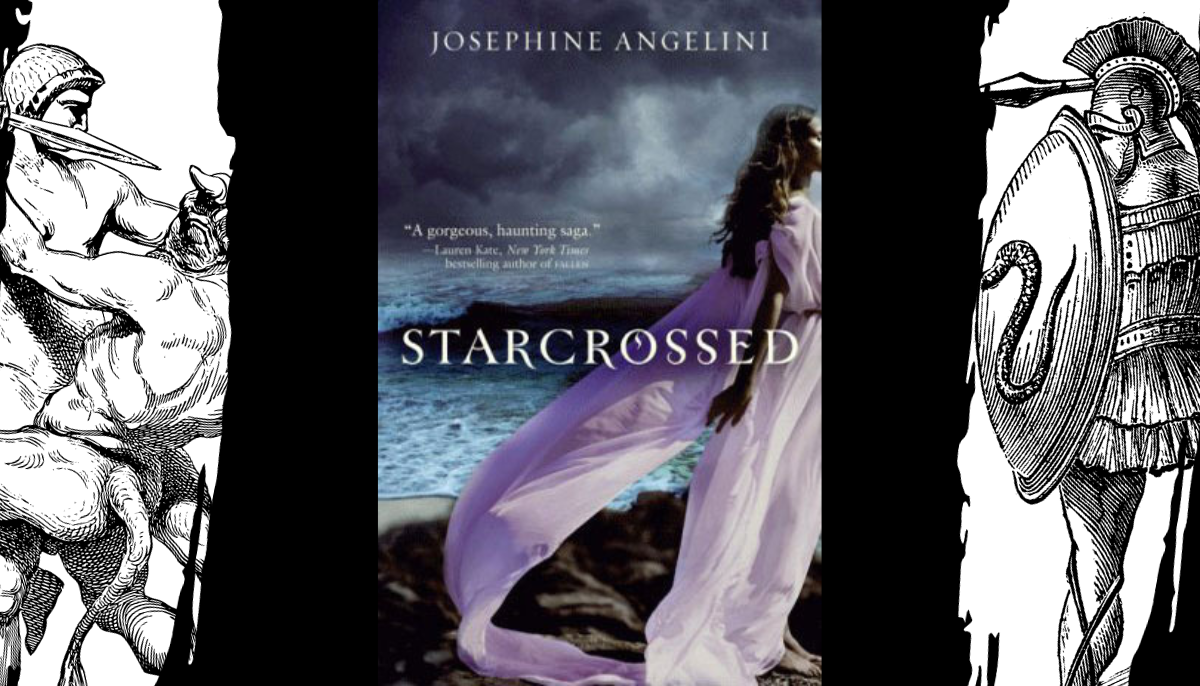
“Starcrossed,” by Josephine Angelini, is an intriguing addition to YA novels inspired by Greek mythology. Set against the backdrop of Nantucket, the story intertwines the modern world with ancient myths uniquely and compellingly. However, it’s a book that might evoke mixed reactions, mainly due to its characters and initial narrative style.
The protagonist, Helen Hamilton, initially comes across as stereotypical – the “perfect yet unaware” type. This portrayal can be off-putting at first, as Helen’s character struggles with self-recognition and confidence, often underplaying her abilities and worth.
Despite this, Helen’s character shows significant growth as the story progresses. Her journey is not just about discovering her demigod powers but also about embracing her identity and overcoming personal insecurities. The transformation in her character is well-handled, providing a satisfying character arc that compensates for the initial frustration.
One of the book’s strengths is its well-constructed mythological world. Angelini skillfully blends Greek mythology with a contemporary setting, creating an engaging backdrop for the story. The explanations provided for the characters’ powers and their connections to Greek gods are detailed and plausible within the story’s framework.
However, the book does have its shortcomings. The initial pacing can feel slow, and the story’s beginning is laden with exposition that might deter some readers. Additionally, some plot elements can be confusing, requiring patience and attention to grasp the intricacies of the story entirely.
Readers who persist past the initial chapters are rewarded with a richly detailed mythological world and a protagonist who grows into her role as a modern-day descendant of Greek gods. Despite its initial flaws, the novel offers a refreshing take on Greek mythology, making it a worthy read for fans of the genre.
The Star-Touched Queen, Roshani Chokshi
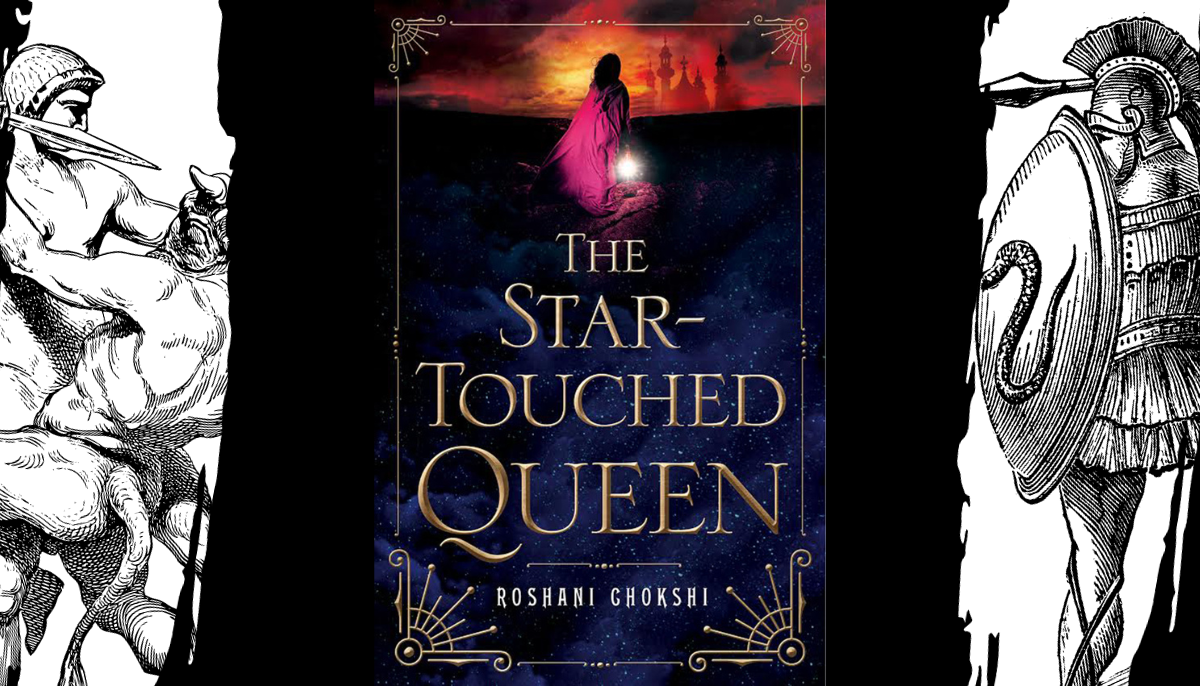
“The Star-Touched Queen” by Roshani Chokshi is a mesmerizing fusion of Greek mythology and Indian folklore, earning its spot as a notable entry in the genre of YA fantasy. Chokshi’s novel is a vibrant tapestry of magic, romance, and destiny, all woven together in a richly imagined world that captivates the reader from the first page.
The protagonist, Maya, is a seventeen-year-old princess with a cursed horoscope that promises a marriage of death and destruction. This curse has marginalized her in her father’s kingdom despite her royal status.
Her life takes a dramatic turn when she’s hastily married off for political reasons and finds herself in Akaran, a realm with secrets and magic. As Maya navigates her new roles as queen and wife to Amar, she discovers power, love, and a deep-seated mystery that threatens both the human and otherworldly realms.
Chokshi’s writing is lush and poetic, vividly painting a world as enchanting as dangerous. The blend of Indian cultural elements with mythological themes is seamless, creating a unique and refreshing narrative. The imagery of the royal courts, the vivid colors, and the mystical elements of the story are all brought to life with a rare and captivating richness.
Maya, as a character, is beautifully developed. She’s not just a damsel in distress but a strong, intelligent woman who grows into her power and learns to trust her instincts. Her journey of self-discovery and the challenges she faces in unraveling the secrets of her past and her kingdom are engaging and heartfelt. Amar, the mysterious husband, adds depth to the narrative, with his character gradually unfolding as the story progresses.
The romantic aspects of the story are woven with a blend of passion and tenderness. Chokshi manages to create a sweeping and believable romance, avoiding the clichés often seen in YA fantasy. The relationship between Maya and Amar is complex and deeply rooted in the larger narrative, adding to the mythological and magical elements of the story.
The world-building in The Star-Touched Queen is exceptional. Chokshi creates a universe where myth and reality intersect, where the lines between human and divine are blurred. The descriptions of the otherworldly realms are breathtaking, filled with mythical creatures and landscapes that ignite the imagination.
The Cold Is in Her Bones, Peternelle van Arsdale
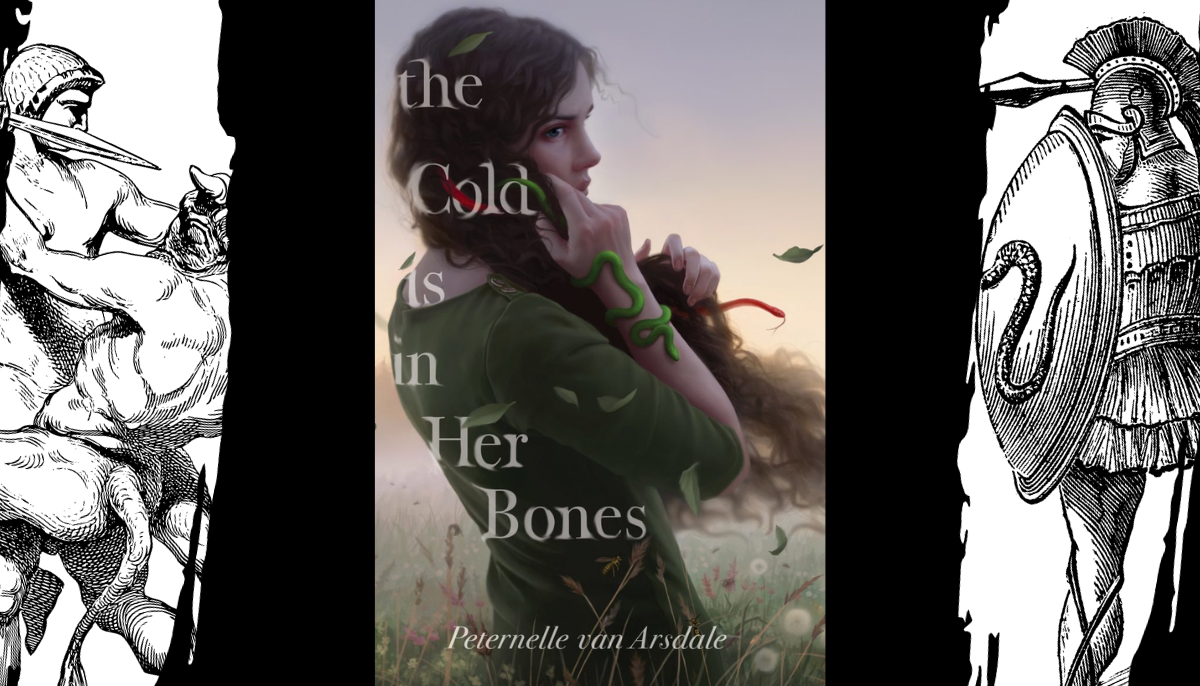
“The Cold Is in Her Bones” by Peternelle van Arsdale is a hauntingly beautiful novel that weaves a tale of pain, love, and redemption, drawing inspiration from the myth of Medusa. This story stands out in the YA fantasy genre for its depth of emotion and how it resonates with universal themes of self-acceptance and breaking free from societal constraints.
The protagonist, Milla, is a girl confined to her family’s farm, isolated and longing for connection. Her life changes when Iris arrives, bringing with her the secret of a curse haunting the village—a demon possessing girls without warning. Milla’s journey begins when Iris, her newfound friend, becomes a victim of this curse, compelling Milla to embark on a quest not just to save Iris but to confront and break the curse itself. This quest becomes even more personal as Milla grapples with her transformation, fearing she may become a demon, too.
Van Arsdale’s narrative style is both lyrical and evocative, creating a dark and atmospheric setting that enhances the story’s emotional depth. The novel’s strength lies in its character development, particularly of Milla, who is portrayed not as a conventional heroine but as a real, flawed individual. Her struggle is relatable: the desire to be seen and understood, to break free from the roles assigned by society, and to confront the fears that hold her back.
This book is more than a fairy tale retelling; it’s a powerful commentary on the roles and expectations placed on girls and women. Milla’s journey of self-discovery and her fight against the forces that seek to define and control her is a compelling narrative that speaks to the heart of every reader who has ever felt constrained by societal norms.
The themes of love and family are also central to the story. This is not a tale of romantic love leading to a traditional ‘happily ever after,’ but one where the love of self, family, and friends is celebrated as a powerful force of change and redemption. The relationships in the book are beautifully crafted, adding layers of complexity and realism to the story.
Bull, David Elliott
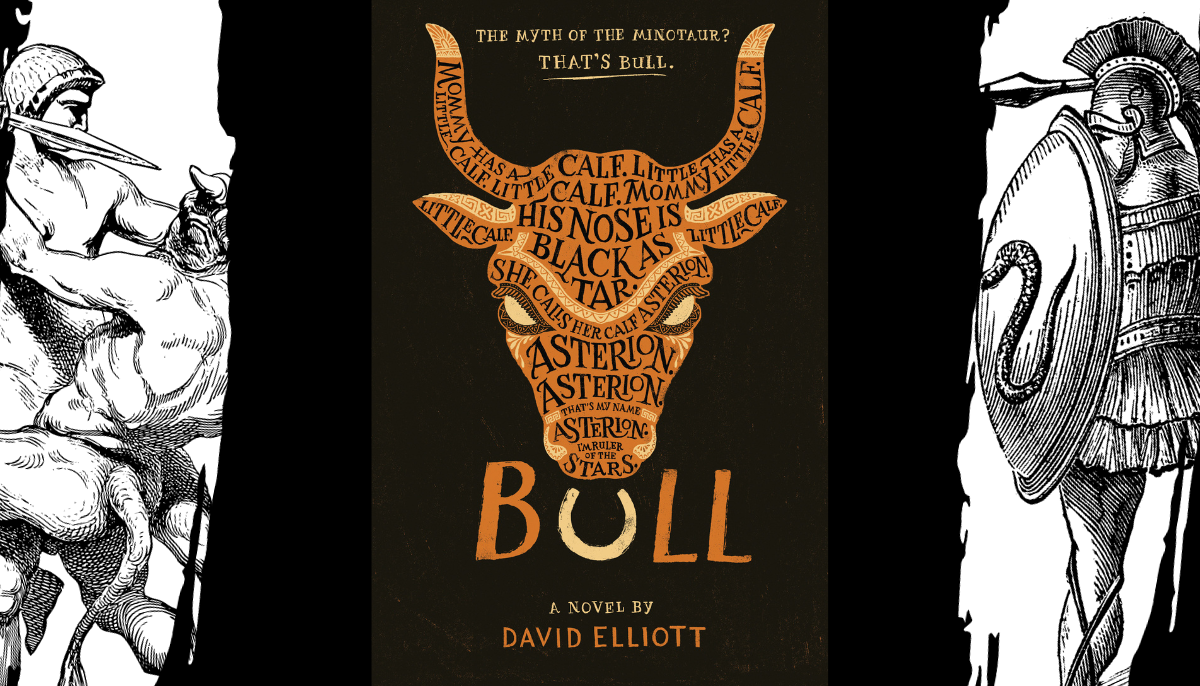
“Bull,” authored by David Elliott, offers a fresh and audacious retelling of the classic myth of Theseus and the Minotaur, sure to captivate readers seeking a novel approach to Greek mythology. This young adult novel, written in verse, stands out for its unique style, dark humor, and contemporary flair.
Elliott’s work can be likened to a modern-day Shakespearean play with a twist. It retains the core elements of the original myth but presents it in an inventive and engaging way. Using verse as the medium adds an intriguing rhythm to the storytelling, making it more accessible and appealing to a younger audience.
The novel is characterized by its wit and irreverence. Elliott does not shy away from using modern language, including swearing and sexual references, which lends a certain edginess to the narrative. This approach might not be everyone’s cup of tea, but for those who appreciate a bit of dark comedy in their mythology, “Bull” is a delightful read.
The story is told from multiple perspectives, with Poseidon’s narrative taking center stage. Elliott’s portrayal of Poseidon as a love-to-hate character is particularly noteworthy. He’s depicted not as a revered deity but as a flawed, inconsistent figure, adding complexity to the story.
One of the novel’s strengths is how it explores the Minotaur’s character, delving into his childhood and offering a different perspective on this infamous monster. This exploration allows for a deeper emotional connection with the character, challenging the traditional view of the Minotaur as merely a beast to be slain.
“Bull” also shines in its “behind the scenes” approach to the myth, providing new insights and interpretations of the characters and events. The humor is twisted yet intelligent, and the novel does a fantastic job of balancing the comedic elements with the story’s darker aspects.
It’s a bold and entertaining read that breathes new life into Greek mythology, appealing to fans of the genre and those looking for something different in YA literature.
Lovely War, Julie Berry
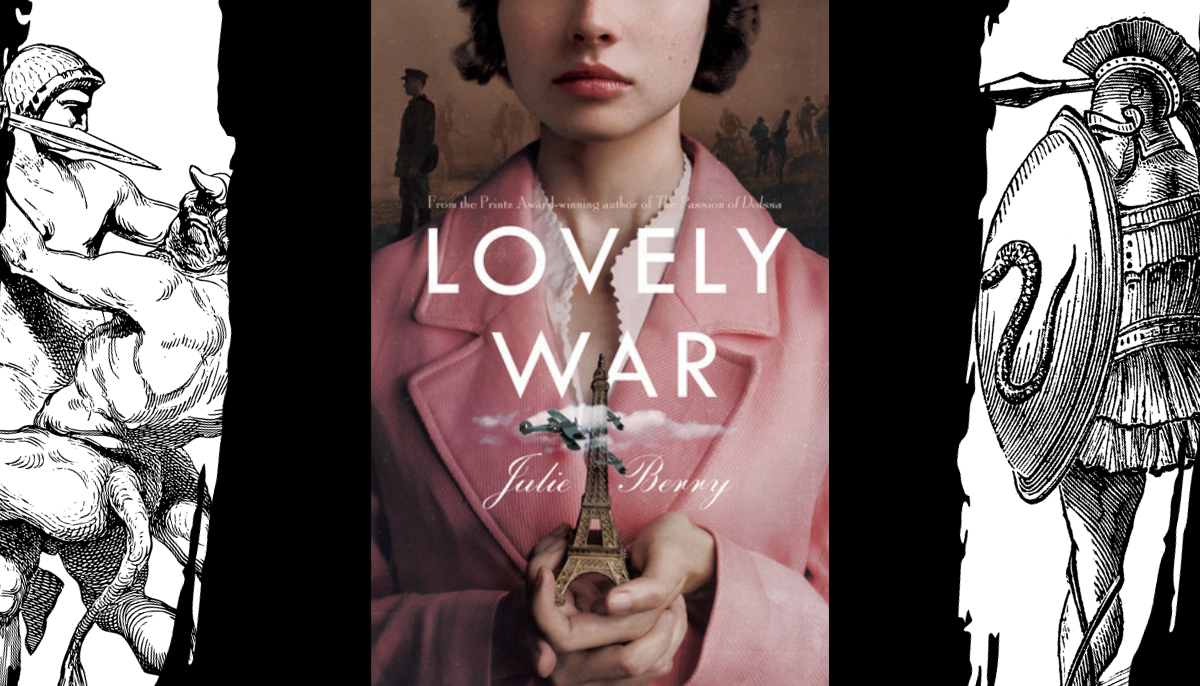
“Lovely War” by Julie Berry is a remarkable blend of historical romance and mythology set against the backdrop of World War I. The novel stands out for its unique narrative structure, heartfelt storytelling, exploration of love, war, and the enduring power of music.
The story follows two couples – Hazel and James, and Aubrey and Colette – as they navigate the challenges and uncertainties of love during the tumultuous times of World War I. Hazel, a shy pianist, and James, a soldier with dreams of becoming an architect, find their love abruptly interrupted by the war.
Similarly, Aubrey, a talented musician, and Colette, a Belgian songstress with a tragic past, discover love in unlikely circumstances. Their stories are intertwined and narrated by Greek gods, primarily Aphrodite, who seeks to prove to her husband, Hephaestus, and lover, Ares, the resilience and significance of love even amidst the horrors of war.
Berry’s decision to have the Greek gods narrate the story adds a timeless and ethereal quality to the narrative, bringing a unique perspective to the historical events. This approach provides a fresh take on the well-trodden paths of World War I stories and allows for a deeper exploration of themes like fate, passion, and the power of love.
The novel excels in portraying the small, intimate moments against the larger backdrop of war. Berry skillfully captures the essence of human emotions – the joy, the sorrow, the longing – amid a world torn apart by conflict. The attention to historical detail is meticulous, immersing the reader in the era’s atmosphere while maintaining a narrative that is accessible and engaging.
While the novel juggles multiple perspectives, which may sometimes distract some readers, each character is well-developed and contributes to the story’s rich tapestry. The book handles heavy topics such as racism, PTSD, and the trauma of war with sensitivity and grace, offering a well-rounded portrayal of the era.
The Goddess Test, Aimee Carter
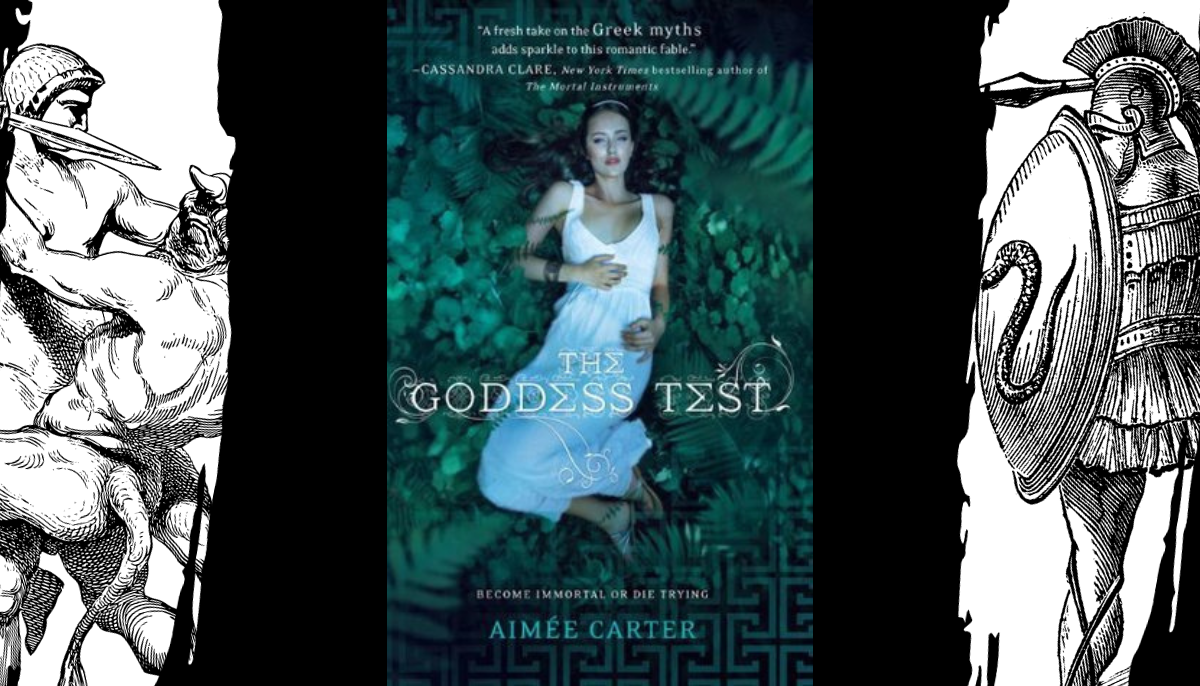
“The Goddess Test” by Aimee Carter earns a place in our selection of top YA books infused with Greek mythology. This novel stands out with its engaging blend of romance, mystery, and mythological elements, offering a refreshing take on the Hades and Persephone myth.
The story revolves around Kate, a relatable and strong protagonist facing the immense challenge of passing seven tests to save her dying mother. The twist? The tests are administered by Henry, a captivating character claiming to be Hades, the god of the Underworld.
Carter’s portrayal of Henry as a complex, empathetic figure is a highlight, deviating from the traditional depiction of Hades as a villain. This reimagining allows for a richer exploration of his character and provides an appealing contrast to the usual mythological narratives.
Kate’s journey is not just about the tests; it’s a deep dive into personal growth, courage, and resilience. Her character development is skillfully handled, making her one of the most compelling heroines in recent YA fiction. She navigates her trials with a blend of strength and vulnerability, making her journey thrilling and emotionally resonant.
The romance between Kate and Henry evolves beautifully, striking a balance between sweet and intense. Their relationship’s gradual development adds depth to the story, avoiding the pitfall of forced or superficial romance often seen in YA novels. This slow-burn romance is underpinned by mutual respect and a growing understanding, adding a layer of authenticity to their connection.

